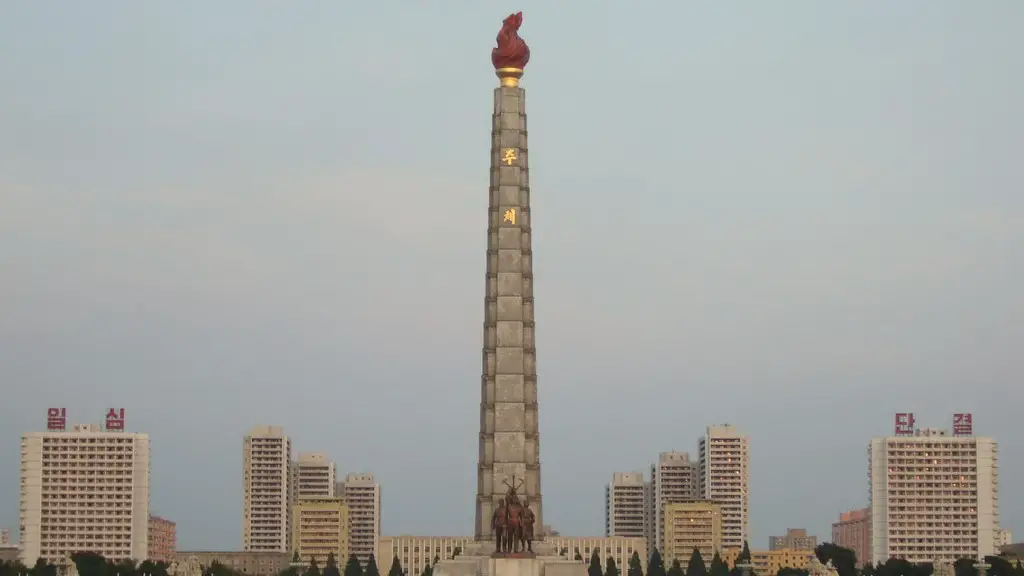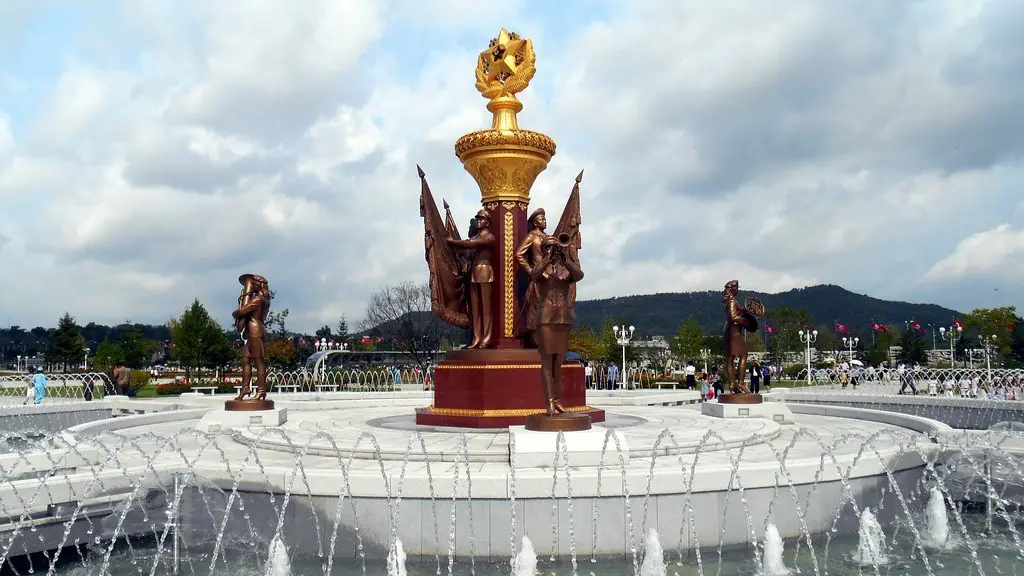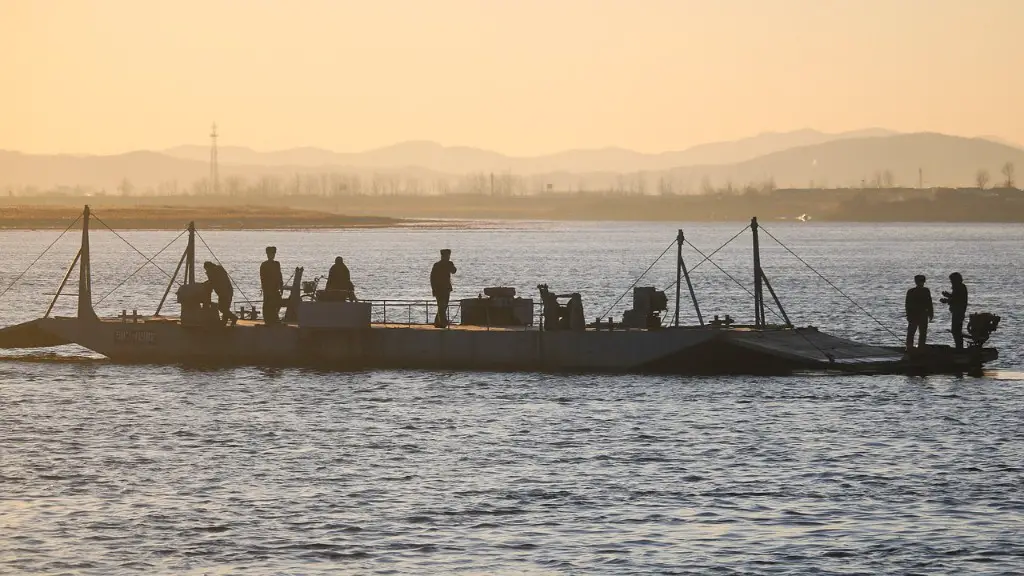When it comes to the question of why North Korea has not been invaded, there are a variety of elements that need to be addressed. From geopolitical concerns, to diplomatic relations, to military strategy, the situation is far more complex than what may initially meet the eye.
Historically, the Korean Peninsula has experienced numerous wars and crises since the division of North and South Korea in 1948. In modern times, the Korean demilitarized zone (DMZ), the heavily fortified demarcation line between North and South Korea serves as a reminder of the precarious balance maintaining peace between the two countries.
According to experts, a large part of why North Korea hasn’t been invaded is due to the fact that North Korea possesses nuclear weapons. North Korea’s nuclear weapon stockpile provides assurance to the North Korean leadership that it can defend against any invasion. The nuclear threat also serves to deter potential foreign aggressors from launching an attack against North Korea, as any nuclear weapon use would have disastrous consequences.
It is also important to note the role of China and the United States. While China and the United States are not on friendly terms, they have a mutual understanding that an invasion of North Korea would lead to a catastrophic regional war. The creation of a unified Korea would threaten China’s economic and political interests in the region and alter the power balance between the two great powers.
Additionally, the partnership between China and the United States, coupled with the large number of U.S. military personnel stationed in South Korea and Japan, creates a formidable deterrent against any invasion of North Korea.
Finally, there is the issue of U.S. public opinion. Polls have consistently demonstrated that the U.S. public does not favor a military solution in North Korea. The U.S. government is also keenly aware of the potentially disastrous consequences of an invasion of North Korea and its potentially destabilizing impact on the region.
International Relations
International relations also play a major role in why North Korea has not been invaded. North Korea has sought to cultivate relationships with countries such as Russia, India and China in order to protect itself from the threat of an invasion. By developing cooperative relationships with these countries, North Korea is able to strengthen its defensive posture.
North Korea has also sought to engage in diplomacy and negotiations, seeking economic assistance and trade relations in exchange for its agreement to cooperate in international disarmament and other non-proliferation efforts. This has allowed North Korea to raise the costs of invasion and make it less attractive in the eyes of potential adversaries.
Although careful diplomatic and military strategies may have contributed to why North Korea has yet to be invaded, there remains the risk of miscalculation whereby a major incident could lead to a rapid escalation of violence, potentially resulting in an invasion of North Korea.
In the current unstable geopolitical environment, North Korea is likely to retain its defensive posture in an effort to ward off any potential invasion. This means that North Korea will continue to rely on diplomatic and military measures to keep itself secure, for the time being at least.
Economic Factors
Economic factors are also a key factor in why North Korea has not been invaded. North Korea’s economic situation is complicated, as while it is economically isolated, it has managed to maintain a steady GDP growth and develop a thriving economy. North Korea is dependent on trade with China and Russia for much of its economic growth and success. An invasion of North Korea would instantly disrupt these economic relationships and could potentially bankrupt the country.
Furthermore, North Korea is an incredibly poor country and the cost of mounting a successful invasion is likely too high for most potential adversaries. North Korea does have some advanced military capabilities, but these pale in comparison to the resources of an invading force. An invasion of North Korea is therefore likely to be a costly and risky venture.
Finally, North Korea also has a sizeable population of around 25 million people. This makes it a large and highly unpredictable target, especially when one considers the unpredictable nature of dictatorships such as North Korea. In a confrontation of this magnitude, no one can guarantee success, and a botched or failed invasion may lead to further destabilization of the region.
Government Structure
The government structure of North Korea also plays a major role as to why it has not yet been invaded. North Korea is an authoritarian dictatorship and is one of the most repressive regimes in the world. It is governed by an elite group of leaders, led by Supreme Leader Kim Jong-un. The regime utilizes extreme levels of repression and human rights abuses in order to maintain control over its population.
Due to its authoritarian structure, North Korea has been able to rally its people to defend against the threat of invasion. Through its powerful propaganda machine, North Korea is able to create a false sense of unity and strength amongst its citizens, creating a sense of shared sacrifice and commitment to its defense. Moreover, the regime is able to rely on its formidable security apparatus to control its population and maintain control in the event of an invasion.
In addition, the regime has used a variety of strategies to discourage alliances amongst its neighbors and to prevent countries from joining forces against it. Through the use of economic aid, diplomatic pressure, and military intimidation, North Korea has been able to discourage countries from tabling an invasion plan.
Finally, North Korea has also sought to increase its military capabilities in order to deter an invasion. Through its missile and nuclear weapons program, North Korea has attempted to develop the means to retaliate against a potential aggressor.
Power Struggles
The power struggles in the region are another key reason why North Korea has not been invaded. Over the past few years, there has been a complicated dynamic between North Korea, South Korea, China and the United States. All four countries have sought to increase their own power in the region, while at the same time, attempting to counter the ambitions of their rivals.
This has created a situation of great uncertainty, and it has become increasingly difficult for any of the four powers to make a bold move, such as an invasion of North Korea, without the fear of retaliatory action. This dynamic has caused a stalemate in the region, with no country wishing to make the first move.
Furthermore, North Korea has also sought to increase its influence in the region, particularly over its neighbors South Korea and Japan. North Korea’s growing influence and its threatening rhetoric have further discouraged any potential invader from taking aggressive action.
Finally, North Korea has also been able to use its influence over its allies, such as China and Russia, to restrain any potential aggression from those countries. Through its economic and diplomatic ties, North Korea has been able to ensure that its allies do not join any kind of military action against it.
The Role of the United Nations
The United Nations also plays a major role in why North Korea has not yet been invaded. The United Nations has long been an advocate of diplomacy and non-military solutions to international conflicts. Through its large membership and its global reach, the United Nations has been able to foster and facilitate negotiations between countries in an effort to prevent conflicts from escalating.
More specifically, the United Nations has put considerable pressure on North Korea to end its nuclear weapons program and to agree to a peaceful resolution to its ongoing dispute with South Korea. This pressure has been effective at ensuring that North Korea does not take provocative actions that may provoke an invasion and has helped ensure that North Korea is kept in check and does not become a rogue state.
Additionally, the United Nations has enforced economic sanctions and arms embargoes against North Korea in an effort to discourage and punish the regime for its dangerous and provocative behavior. These measures have been effective in denying North Korea the financial and military resources it would need to successfully repel an invasion.
Finally, the United Nations has also deployed peacekeeping forces to the region in an effort to deter any potential conflicts between North and South Korea. This has helped to de-escalate any potential tensions in the region, eliminating the possibility of an accidental escalation into a full-scale conflict.
Conclusion
Overall, it is clear that there are a variety of reasons why North Korea has yet to be invaded. From nuclear weapons, to economic concerns, to international negotiations, there are numerous factors at play in this complicated situation. It is also clear that North Korea is taking proactive measures to defend itself, such as developing its military capabilities and cultivating relationships with its allies. In addition, the United Nations is playing a critical role in ensuring that any potential conflict between North and South Korea is peacefully resolved. For the foreseeable future, it seems that North Korea is likely to remain secure against any kind of invasion.





